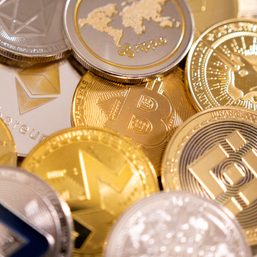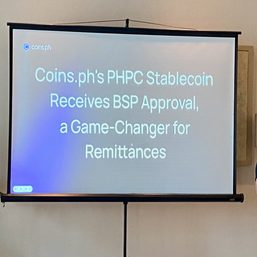SUMMARY
This is AI generated summarization, which may have errors. For context, always refer to the full article.

MANILA, Philippines – In 2024, local cryptocurrency exchange Coins.ph has big plans to expand to five continents – and crypto remittances by overseas Filipinos is fueling that growth.
“My goal has always been, from day one, in Coins is basically, we’re going to take what we build here, and we’re going to want to bring that back to not just Filipino users here in the Philippines, but potentially Filipino users outside of the Philippines,” said Wei Zhou, chief executive officer of Coins.ph and former chief finance officer of rival cryptocurrency exchange Binance.
“With some of our innovations that we’re building here, we want to take Coins.ph global, and be one of the first Filipino companies that have a real global footprint – servicing, not just Filipinos, but other people across the world,” he added.
Currently, Coins.ph has already obtained licenses to operate in Europe, Latin America, Australia, and Africa. Coins.ph country manager Jen Bilango told Rappler that the company will be operating in three out of five continents by the end of the first half of 2024 and in all five before the end of the year.
This expansion means that the app will be accessible and downloadable in countries outside of the Philippines. Aside from local communities in other countries using the app for retail trade, Coins.ph is eyeing another big target market – overseas Filipinos sending remittances.
“With remittances being a vital contributor to the economy, we’ve made strategic partnerships that can provide better solutions for sending and receiving money abroad,” Bilango said during a roundtable on Thursday, January 25.
For instance, an overseas Filipino in another country may convert their earnings into a stablecoin – a non-volatile cryptocurrency whose value is usually pegged 1:1 to the US dollar – which can then be sent to a crypto wallet in the Philippines.
Because crypto transactions happen quickly, cheaply, and digitally, crypto could be key for Filipinos to avoid longer wait times and high fees in traditional financial institutions like banks and “pera padala” centers.
Until Coins.ph is officially launched in their country of work, overseas Filipinos looking to use it for remittances should download and install the app first in the Philippines, as the app will not be downloadable in other areas. However, once installed, Filipinos can use the app for transactions even outside the Philippines.
The company is also eyeing other countries to expand to, such as the Middle East, which has millions of overseas Filipino workers that remit back billions of pesos every year.
However, to tap big overseas Filipino markets in the United States and other nearby Asian countries, the Philippine-based cryptocurrency exchange may turn to partnerships rather than holding a direct license.
“Getting licenses in the US costs millions of dollars. The same is true of Japan, Korea, Hong Kong,” said the company’s CEO. “In those regions, we hope to be able to build partnerships. We hope to be able to leverage off of their licenses and their partnerships in those regions to provide our services.”
No Binance? Opportunities await
Binance, the largest crypto trading platform in the world, has been blocked in the Philippines by the Securities and Exchange Commission (SEC), which points out that the company is not authorized to sell or offer securities here. The order also came after Binance’s CEO pleaded guilty to breaking anti-money laundering laws in the US.
Filipinos using Binance still have some time to close their positions and bring out their investments. But if you ask Coins.ph’s Zhou, the shutdown of his former company’s operations in the Philippines presents opportunities.
“We will have more opportunities. We will be able to onboard users onto our platform,” he said. “But I think it also creates challenges…for the existing users that may have been trading on the offshore exchanges.”
The home-grown cryptocurrency exchange plans to pull in those Binance users with zero trade fees to make the transition “seamless.” Coins.ph is also attempting to ramp up their product offering to match the range of sophisticated financial products that offshore – but unregulated – crypto exchanges like Binance have.
Zhou said that they want to achieve as much product parity with offshore exchanges by “maybe 2025,” pointing out that as a regulated exchange, Coins.ph has to obtain approval for each type of product.
Coins.ph is regulated by the Bangko Sentral ng Pilipinas (BPS) and the SEC. It holds licenses as an electronic money issuer and as a virtual asset service provider, which is the license that the BSP requires for crypto-based companies. – Rappler.com
Add a comment
How does this make you feel?









![[Finterest] Is a digital bank safe, and how can you best use it?](https://www.rappler.com/tachyon/2024/05/digital-banks-safety-may-11-2024.jpg?resize=257%2C257&crop_strategy=attention)
There are no comments yet. Add your comment to start the conversation.